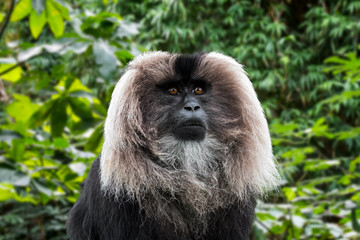ANIMAL: Lion-Tailed Macaque Macaca silenus Type of Animal: Old World Monkey Habitat: Montane forest, monsoon forest, tropical rainforest, jungle Location(s): W. Ghats of India Appearance: Dark-brown to black w/ prominent mane & tail tuft. Male larger than female. Babies black. Food/Diet: Fruit, leaves, berries, seeds, insects, fungi, buds, flowers, stems, veggies, legumes, grains, shoots, pith, spiders, eggs, frogs, insect larvae, small birds, nuts, worms, lizards, roots Status in Wild: Endangered Conservation: Breeding from zoos, wildlife parks, & breeding centers Lifestyle: Usually found in troops of 10-20, consisting of alpha male, numerous females & offspring, along w/ a few subordinate males. Additional Info: Called: Male Female Young-Infant Group-Troop Weight: Male- 11-22 lbs Female- 4.4-13 lbs Young- 3.5 lbs Gestation: 6 months Height: Male- 1.67-2 ft Female- 1.37-1.5 ft Body Length: Male- 1.67-2 ft Female- 1.37-1.5 ft Life Span: 20 years in wild, 30 years in captivity Tail Length: Male- 0.78-1.28 ft Female- 0.82-1.04 ft Main predators are pythons, raptors, tigers, leopards, and dholes. Endangered due to logging/deforestation, habitat loss, pet trade, & hunting for use for meat/medicinal purposes/fur. Females sexually mature at 4 years, males at 5 years. Fights between alpha males of different troops sometimes result in death from canine teeth wounds. Alpha male usually defends troop territory. They smack their lips to greet one another & yawn to show dominance. They have up to 17 different vocal patterns. They’re diurnal, generally active during the day. When female’s in heat, area under her tail swells up. They generally stay high in the canopy. Females almost always only have 1 offspring at a time. Females remain in same troop for life, while young males disperse w/ other young males. Due to diet, play important role as seed dispersers. They get lots of moisture by licking dew from leaves They’ll freeze in treetops if they see a human or predator. Like many primates, they can store food in cheek pouches. Fun Fact(s): While much shier than other macaques, they’re still fierce if cornered using sharp canine teeth. Due to its mane, sometimes called “beard ape.” Also called wanderoo.
